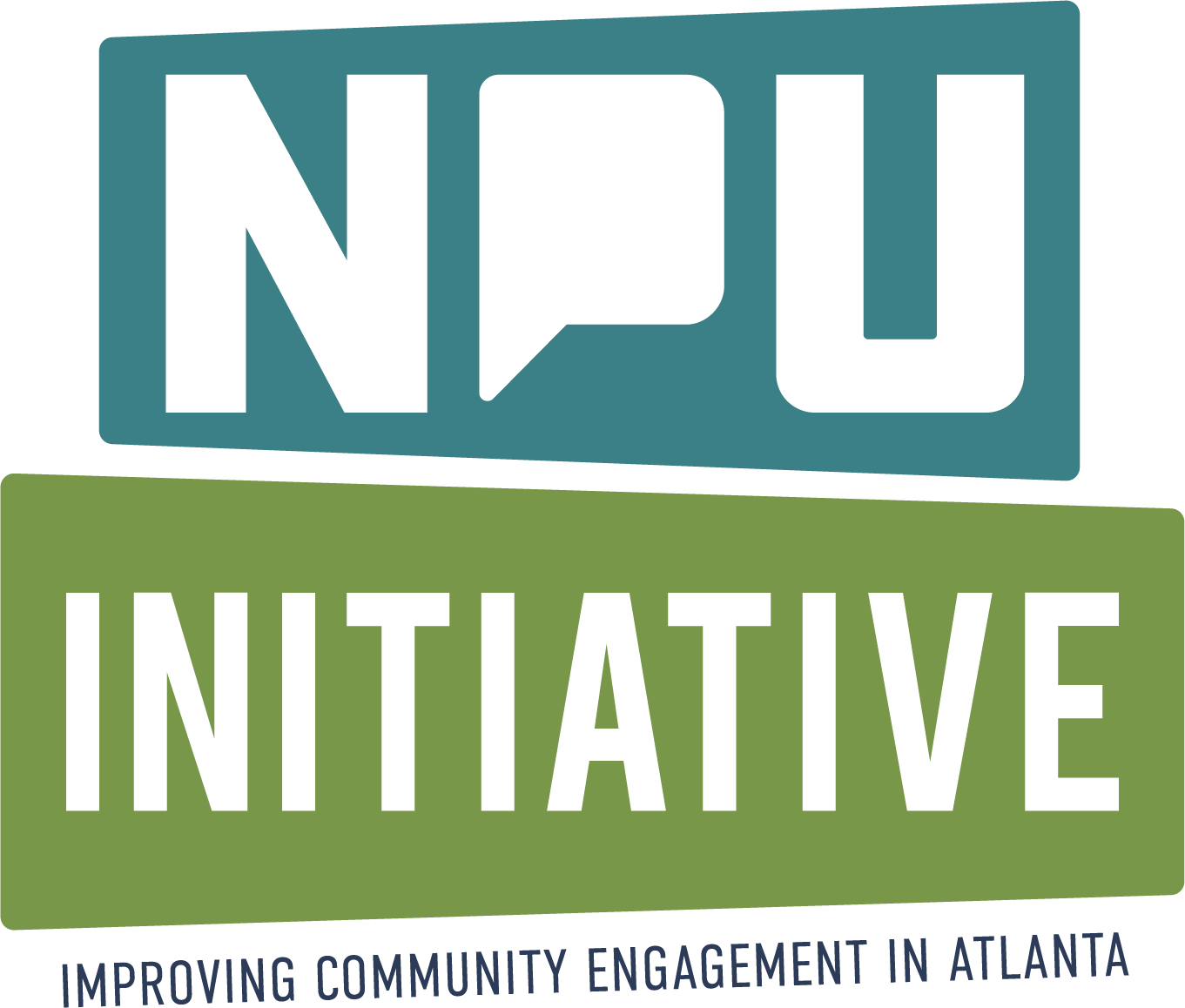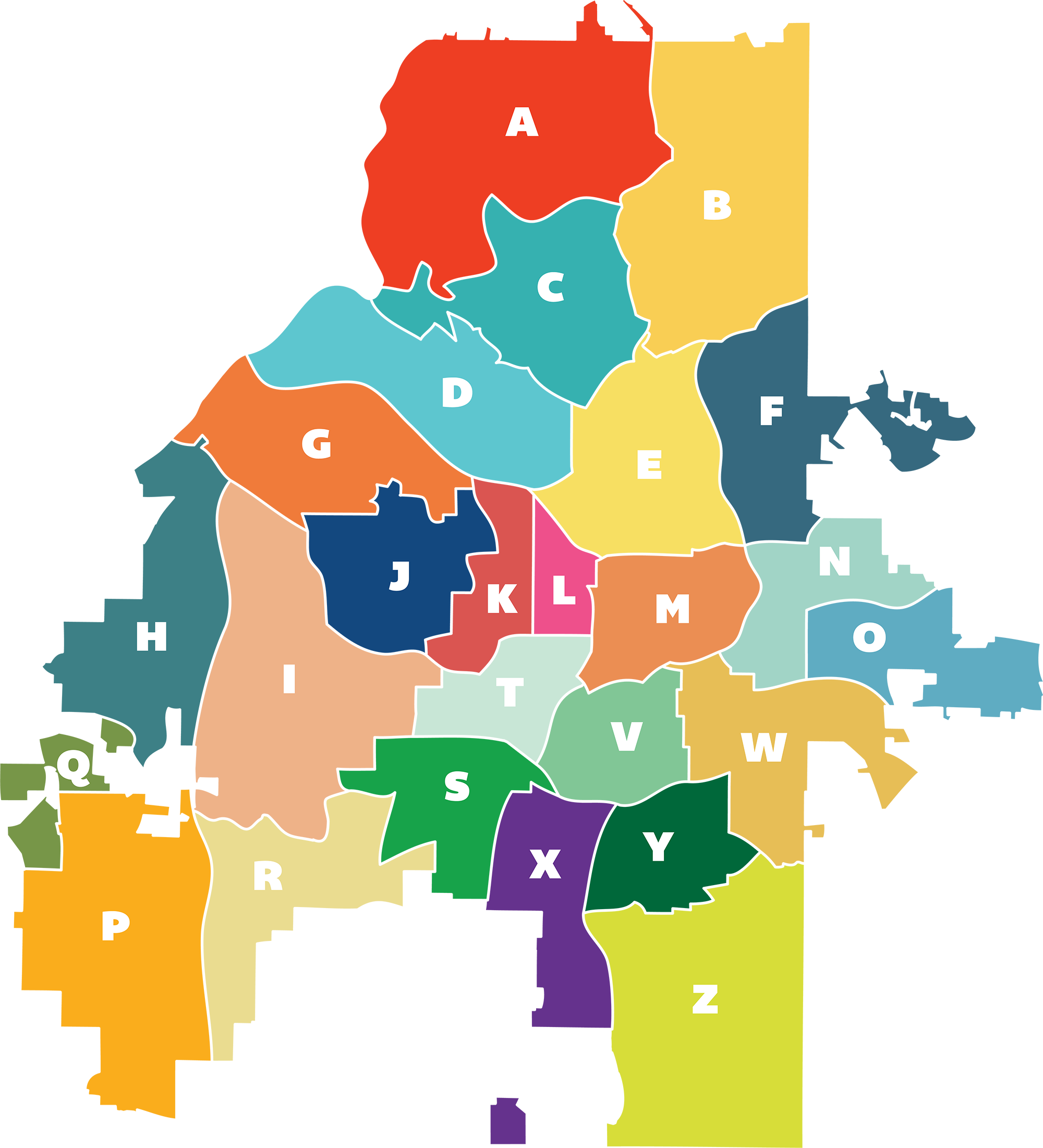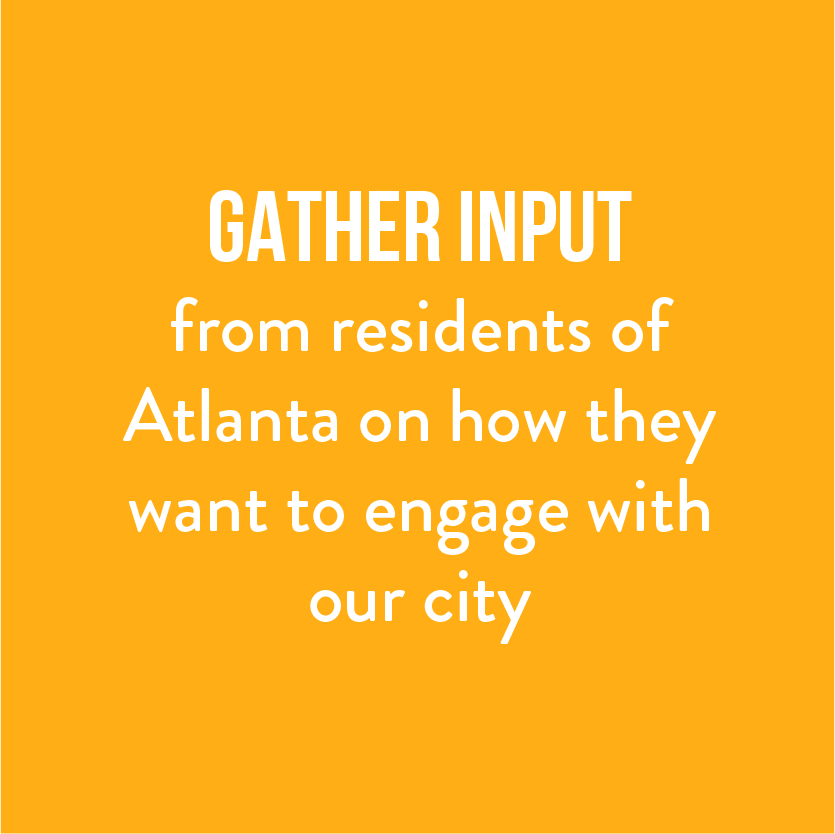The NPU Initiative is a independently-led, multi-year review of the City of Atlanta’s official system for community engagement — the Neighborhood Planning Units (NPU).
The NPU Initiative is an effort by the Center for Civic Innovation to improve community engagement in Atlanta. Our mission is to address issues of inequality in our city through solutions built from the ground up, and we believe that finding and supporting community solutions to community problems starts with making sure that everyone can be heard.
Atlanta’s Neighborhood Planning Units were conceived for exactly that purpose back in 1974, but how well are they working 45 years later? Together with a growing coalition of like-minded community groups across Atlanta, we’re taking a look at the state of the NPU system and thinking big about how it could be better: more accessible, more inclusive, and more representative of the communities they serve.
Neighborhood Planning Units
The City of Atlanta is divided into
25 NPUs.
Each contains at least two individual neighborhoods and has been assigned a letter of the alphabet from A to Z.*
*Except for U, because that would be confusing.
How does the NPU System work?
City officials provide information to and get feedback from the NPUs on public safety, public works, permits, parks, and other neighborhood planning matters.
Everyone over the age of 18 who lives in Atlanta’s city limits is a member of an NPU.
Property owners, business owners, and organizations can have a representative member, too.
NPUs typically meet once a month to conduct business.
Each NPU has its own bylaws so there’s no one-size-fits-all description.
NPUs help prepare the Comprehensive Development Plan dealing with the physical, social, and economic aspects of our city.
SINCE 1974
THE NPU SYSTEM HAS BEEN THE CITY OF ATLANTA’S OFFICIAL WAY TO ENGAGE WITH RESIDENTS

Who came up with NPUs?
RESIDENTS
In the early 1970s, community activists demanded a greater voice at city hall to save their neighborhoods.
state legislators
In 1973, state legislators included requirements for citizen participation in the City of Atlanta’s new charter.
city leaders
In 1974, Mayor Maynard Jackson and the City Council created the NPUs to ensure residents would be heard.
AN INDEPENDENTLY-LED, MULTI-YEAR STUDY AND REVIEW OF THE CITY OF ATLANTA’S HISTORIC NEIGHBORHOOD PLANNING UNIT SYSTEM

How the NPU Initiative will work
FIND YOUR NPU!
NPU Initiative FAQs
+ Why an NPU Initiative?
As an organization, we are driven by the charge to end social and economic inequality in Atlanta. We believe that strong civic engagement is a key component to making sure that the solutions reflect the needs and voices of all people who call our city home. We decided to specifically focus on the Neighborhood Planning Unit system in this work for a few main reasons:
1. We have believed in and advocated for the NPU system since we were founded.
In 2015, the Center for Civic Innovation led the South Downtown Initiative, an effort to ensure that the voices of residents and businesses were heard as South Downtown went through some significant changes. At the center of discussion was the sale of Underground Atlanta. Ultimately, even after hosting a number of community discussions for almost two years in partnership with NPU M, the Atlanta Downtown Neighborhood Association, and other community stakeholders, the perspective and voice of the NPU and other neighborhood groups were ignored and vilified on the basis of “sovereign immunity.” This multi-month saga unveiled some major flaws in our city’s community engagement processes. This situation, among many things, highlighted that NPUs are not always treated respectfully and do not always get all the information they need to share with their communities in a timely manner.
After the situation with Underground Atlanta, the Center for Civic Innovation became a vocal advocate for including stronger support for NPUs and better community engagement processes.
2. The NPU system hasn’t been formally studied or reviewed in over 40 years -- despite multiple ‘plans’ to.
We pushed for the inclusion and value of Neighborhood Planning Units in multiple efforts over the years, such as the Atlanta City Design, House ATL recommendations, Resilient Atlanta, and One Atlanta Housing Affordability Action Plan. In addition to this, in 2017 we used our platform and conversations with each candidate to talk about their positions on stronger support for the NPU system. We found that many candidates, just like the general public, for office did not have familiarity with the NPU system -- almost all candidates, including now-mayor Keisha Lance Bottoms, expressed an intention to increase support for NPUs if elected (these interviews can be found at voteatl.org).
The following year, as new and returning candidates took office, we scheduled meetings with all City Council members to follow up on their commitment to the NPU system. In these conversations we learned about each of their positive and/or negative experiences with NPUs. When we asked for recommendations on how we would help advance the support of NPUs to build on our VoteATL work, responses were all one standard deviation away from “bless your heart.”
While often in jest, this response concerned us that NPUs would once again not be a priority, even though it has been listed as one for years among committees and reports. Despite claims for NPUs to be reviewed by all of these entities, there has been no formal further action by any of these agencies and many of these agency leaders have expressed a lack of capacity and/or political will/buy-in.
+ What are the goals?
Our two main stated goals for the NPU Initiative are:
- To educate and inform our fellow Atlantans about the history, purpose, and value of the Neighborhood Planning Unit system
- To work with past, present, and future NPU leaders and residents to identify and propose short and long-term recommendations for solving operational and/or systemic challenges that NPUs are facing.
Ultimately, success for us is:
- More Atlanta residents are informed about the purpose and history of the Neighborhood Planning Units, which hopefully increases engagement across all NPUs
- Enhanced value of the work and leadership of the Neighborhood Planning Units
- Delivery on short-term and long term needs for effectiveness and efficiency, as identified by existing NPU leaders, past NPU leaders, NPU attendees, and residents who do not currently engage with the NPUs
The purpose of this Initiative is not to grade the NPUs or NPU leadership against any standard. The Center for Civic Innovation is not a consulting firm nor are we taking/collecting any fees for advice. We will not be providing any independent recommendations from our organization directly. Recommendations will be co-designed with current NPU leaders, past NPU leaders, NPU attendees, and from residents who do not currently engage with the NPUs. Our role in this initiative is to facilitate and collect data to further support these recommendations.
+ What is the timeline for the project?
Currently the Initiative is divided into three phases:
Phase 1 (Spring 2019-Fall 2019): Listening -- going to all 25 NPUs, hosting collaborative working sessions, and meeting people across the city to learn more about the people involved in the NPU system
Phase 2 (Fall 2019 - Fall 2020): Learning -- surveying the city of Atlanta on community engagement, data collecting and research
Phase 3: (Fall 2020 - Spring 2021): Advocating -- developing recommendations and ideas in collaboration with NPU residents for short-term and long-term improvement
+ What is the end result?
In the short term, our goal is to develop a set of recommendations and ideas in collaboration with NPU residents for short-term and long-term improvements. These recommendations will be informed by data, listening, and working with NPU residents to co-create what the future of the NPU system should be.
The NPU Initiative is the first formal look at the NPU system since 1978 -- we believe that strengthening community engagement should be an ongoing process that continues to improve as cities do. We are in it for the long-haul, and look forward to continuing to support and advocate for neighborhood leaders and their needs, even after the recommendations are published.
+ How can I get involved in the NPU Initiative?
There are tons of ways for you to get involved in the initiative! You can join our listserv, come to a working session, or email us directly.
+ Who is funding the project?
The Center for Civic Innovation is a charitable 501(c)(3) non-profit organization, registered in the State of Georgia. Our funding comes from the generous, unrestricted donations of individuals, foundations, and institutions. The Center for Civic Innovation does not accept restricted capital from any foundations or individuals, with two major exceptions:
We receive a grant from the Sara Blakely Foundation restricted to support women-led community initiatives and we have a long-standing grant from Food Well Alliance to support initiatives that focus on food security. In both of these circumstances, and as is the case with all of our supporters, no donor or investor may dictate the activities of the Center for Civic Innovation. This would be in direct conflict with the approach necessary for true innovation.
In December 2018, the Center for Civic Innovation received two unsolicited, unrestricted end-of-year gift donations from the Annie E. Casey Foundation and the Community Foundation for Greater Atlanta to jumpstart research, planning, and working sessions. Neither organization provided any restrictions or mandates on the use of this capital.
We are using these two grants to support the following costs: (1) meeting costs – food and printing for monthly public working sessions with NPU and community leaders (2) printing of fact sheets and materials for public distribution (3) technology and software to ensure that all data will remain protected, open, and without red tape (4) staff project management support (5) research and data management support from Georgia Tech. We continue to request unrestricted support for this initiative from foundations and individuals, but we have rejected and will continue to reject, any support that requires the funder/donor to be in any decision-making capacity and does not allow us to run the initiative in alignment with our values.
In July 2019, we hosted a comedy show fundraiser that raised money from individual donors to continue support of the NPU Initiative. We also allocated a portion of unrestricted, non-conflicting grants in our general fund to underwrite some of our costs. For example, we receive an annual unrestricted operations grant from Mailchimp and have put a portion of that capital toward supporting staff for this initiative.
At the very beginning of this effort, we publicly stated that we would not accept any capital from the City of Atlanta government. This is not meant to be disrespectful to them (they’re our tax dollars, too), but instead is meant to keep a healthy distance between this initiative and the bureaucracy that can get caught up in City Hall. This does NOT mean we do not want them to participate in this work or that we are not interested in the feedback and guidance from institutions such as APAB. We are actively inviting city council and members of the Mayor’s office to participate in working sessions and feedback. We just did not want to accept city money to avoid even the perception of any bias.
+ Is this a government-led Initiative?
No -- The NPU Initiative is strategically trying to prioritize neighborhood voices, to ensure that our strategies and outcomes are community-driven. While City officials are important to the NPU process, the work done to move the NPU Initiative forward with CCI is driven by existing NPU leaders, past NPU leaders, NPU attendees, and residents who do not currently engage with the NPUs. This happens during our monthly working sessions, NPU visits, and conversations with NPU residents.
+ What role do Councilmembers and the Department of City Planning have in the Initiative?
We have been active in keeping City Council members informed about our progress, and we anticipate maintaining regular and open communication with them. During the later phases of the Initiative, we anticipate there may desire for legislative changes that will need the support of the majority of council and the mayor to implement. However, although we have decided to invite all City Council leaders to participate in this initiative, we have intentionally crafted the initiative to remain independent of City Council – meaning, we did not want to be contracted or formally tied to the City for this effort.
+ What is the survey about?
The NPU Initiative Survey is a ‘pulse check’ on what civic engagement looks like in the city of Atlanta on the neighborhood level. We want to know how people engage with their city, and how the NPU system fits into their understanding of Atlanta’s decision-making process.
Specifically, the survey is designed to do three things:
Collect standardized information from across the city on how and where Atlanta residents are engaging with their city; Assess how many people know about and engage with the NPU system; Learn more about why people attend NPU meetings and what they notice about community engagement on the NPU level
+ Who created the survey?
The NPU Initiative survey was created by CCI, the Public Design Workshop at Georgia Tech, the Atlanta Planning Advisory Board (APAB), and the cohort of Atlanta residents and NPU leaders that have been attending our monthly working sessions.
+ Who is the intended audience for the survey? How will they be asked to participate?
We want to ensure that we get survey responses from as many Atlantans as possible. In order to get a breadth of responses from neighborhoods across the city, we intend to provide a variety of different modes to engage the public in taking the survey. The survey will be available online and offline. We are looking for partners, including NPU leaders, to help us identify the best ways to encourage residents to participate – whether that’s promoting on social media channels, attending events, mailing out copies, etc. We will certainly be looking for people who are currently engaged with the NPUs to respond to the survey, but we must also be engaging with people where they are – at places that NPUs aren’t normally part of the conversation.
+ How will the survey responses be used?
CCI will share the survey responses publicly and help facilitate conversations with community residents and NPU leadership about how the data collected may help inform recommendations and ideas to better support the NPU system.
+ What are the anticipated results for the NPU Initiative?
Our hope is that most, if not all, recommendations that are generated in collaboration with existing and past NPU leadership will be delivered formally to City Council for consideration. The Center for Civic Innovation will not independently or privately deliver any recommendations to City Council without first receiving formal consultation and written feedback from NPU leadership, including APAB. As always, we are prioritizing the neighborhood voices and feedback before any City Council guidance or interference.











